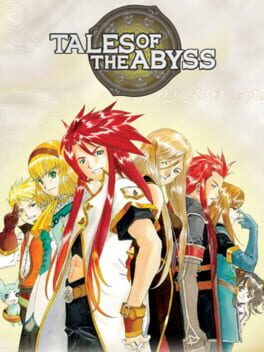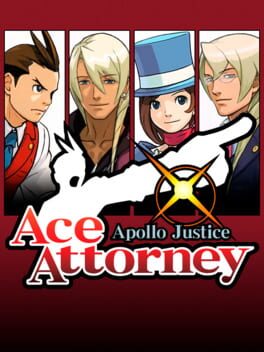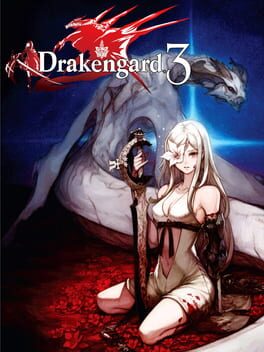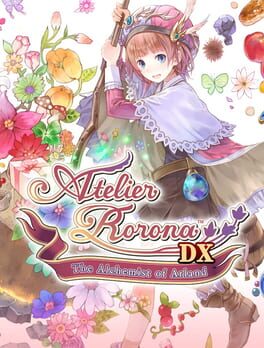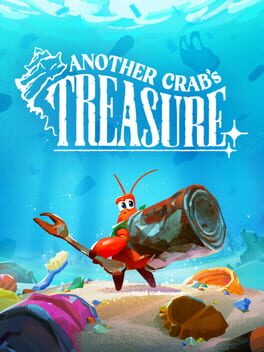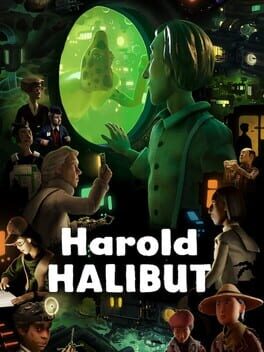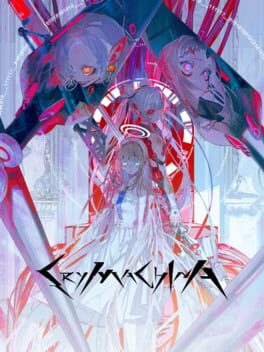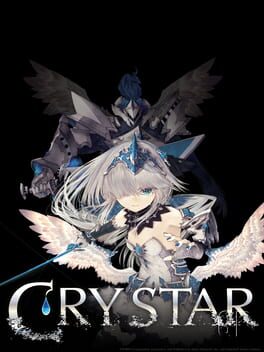starryte
Bio
they/she
they/she
Badges

N00b
Played 100+ games

GOTY '23
Participated in the 2023 Game of the Year Event

Liked
Gained 10+ total review likes

Roadtrip
Voted for at least 3 features on the roadmap

On Schedule
Journaled games once a day for a week straight

Best Friends
Become mutual friends with at least 3 others

GOTY '22
Participated in the 2022 Game of the Year Event

3 Years of Service
Being part of the Backloggd community for 3 years

Noticed
Gained 3+ followers
Favorite Games
107
Total Games Played
009
Played in 2024
005
Games Backloggd
Recently Played See More
Recently Reviewed See More
This review contains spoilers
Spoilers for Crystar as well as Crymachina
This is one I feel very conflicted about. To explain myself, I need to write a little about how I got to this game.
So, a few months prior to this one releasing, I played the same team's prior game, Crystar. To put it quickly, it was a very bad game, but despite the writing being rough around the edges too, it had an absolutely lovely cast of characters and a pretty depressing, Yoko Taro-esque narrative structure which allowed the game to finish off with an emotional payoff that truly hit me like a truck. It's a game that, for all its flaws, had a very strong emotional core that I couldn't help being charmed by.
So when I learned that the same team had a new game just around the corner, I was very excited, and the demo that came out not long before its full release finished selling me on it: it looked a lot better visually, seemed like a step up gameplay-wise (though the bar set by Crystar in that regard was incredibly low)... in short, if it could reproduce the strong emotional effect of Crystar or something close, I felt like it could be a true gem.
And, in some ways, it is a step up from Crystar: the setting is more fleshed out, with less of those rough edges I mentioned before. Most notably for me, the fact that this game is canonically gay helps a lot: in a game that talks about ego and being true to your heart, that kind of message is so much stronger when not all the relationships and characters just so happen to fit a narrow social norm. The setting is also much more fleshed out in general, with all the antagonists having their own motivations and allegiances... another aspect I like is how clear the game is about what kind of ideology the enemy upholds: you're not just fighting a nondescript "system", but rather a group of eugenicists who want "investors" and others to lead them into a new world.
So then, why is it that I don't like this game over Crystar? To put it simply: Crymachina critically lacks the emotional power of its predecessor. Here, the fact that the setting is much more fleshed out actually comes back to haunt Crymachina: despite it having so much more going on than Crystar, which had an extremely simple setting, it actually took me a couple hours less to finish than Crystar. And because of this, this game is packed chock full of twists; too many of them, to be honest. Even major twists, like the one about humanity not being what we thought it was, get brushed aside: after a couple dialogues, the story is back to a steady march toward its grand finale. And this is another difference which made Crystar more impactful: here we have a linear story, versus Crystar's multi-ending structure. And this structure matters, because it helps a lot with telling an emotional story in those 25 hours Crystar has: until the final few hours, you're absolutely going through it, with moments of emotional respite being few and far between. I expected Crymachina to be like this. In fact, for a while after finishing it, this expectation colored my thoughts: I read the whole game as being Ending A, pretty much, and thought I was going to start a new route until I looked up how to get the True End, and got it in a matter of minutes. (This created so much confusion and conflict in my mind, but after a few days of trying to separate expectations from experience, I think I've managed to find a middle ground in my feelings about the game). This is important because, through these many hours of strife, you get attached to the characters. A major tool Crystar uses for this tool are flashbacks where the characters are allowed to narrate their past traumas, using simple but very evocative illustrations from Hajime Ueda. Every major character gets this chance, in Crystar. Now, Crymachina didn't need to reprise this technique, but it did... only for two characters, one of them being Lilly, who is relevant for about 2-3 hours of the story. It's incomprehensible, to me. Nothing justifies using these flashbacks only for Ami and Lilly, instead of say, Leben and Enoa. Crymachina doesn't have time to let everyone talk about themselves though, and so makes these two completely arbitrary choices, and then resumes its march forward.
And so, by the time the game ended, all I felt was that I wanted more. The ending sequence is so short, too; after beating the final boss, it takes maybe five minutes for everything to be wrapped up, if you don't count the credits. That's the disappointing part to me: the ending lacks emotional impact, it lacks gravity, and those things are what I wanted most from Crystar's successor. This is where, most of all, Crymachina falls well short of Crystar.
To be clear, the core aspects of the game are still incredibly strong: the writing is better in some aspects as I mentioned, and the themes of emotional growth and self-determination expressed throughout are truly sweet. Enoa's story, in particular, is beautiful. But, with her as with all the other cast members, I didn't have time to get attached anywhere near as much I'd wanted: this game doesn't allow itself to have a Sen or a Nanami, mostly due to the setting and plot being too dense for this kind of length to also allot time to more expressive character writing. (as a more personal wish, god did I wanna see more of the Trinity! Those fools! Give me more of them!!)
To be honest, saying "this game should've been longer" is frustrating, because I truly do believe Crymachina had everything it takes to elevate itself to the level of something like Tales of Berseria as one of the best, most emotional tales in a JRPG of the past 5 years. But it's simply... too short. It's good, though! It's... just... good. It falls short of excellence by so little, a mere matter of lines of text, and it's a little bit sad, but at least, unlike Berseria's successor, it's certainly far from garbage. But I really wanted this game to be "betterer Crystar", and it was almost that... except in the one defining aspect that made Crystar so charming. A shame, really. I still like it, though, I do want to emphasize this. It's a cool story, at its core, and Enoa deserves all the happiness.
This is one I feel very conflicted about. To explain myself, I need to write a little about how I got to this game.
So, a few months prior to this one releasing, I played the same team's prior game, Crystar. To put it quickly, it was a very bad game, but despite the writing being rough around the edges too, it had an absolutely lovely cast of characters and a pretty depressing, Yoko Taro-esque narrative structure which allowed the game to finish off with an emotional payoff that truly hit me like a truck. It's a game that, for all its flaws, had a very strong emotional core that I couldn't help being charmed by.
So when I learned that the same team had a new game just around the corner, I was very excited, and the demo that came out not long before its full release finished selling me on it: it looked a lot better visually, seemed like a step up gameplay-wise (though the bar set by Crystar in that regard was incredibly low)... in short, if it could reproduce the strong emotional effect of Crystar or something close, I felt like it could be a true gem.
And, in some ways, it is a step up from Crystar: the setting is more fleshed out, with less of those rough edges I mentioned before. Most notably for me, the fact that this game is canonically gay helps a lot: in a game that talks about ego and being true to your heart, that kind of message is so much stronger when not all the relationships and characters just so happen to fit a narrow social norm. The setting is also much more fleshed out in general, with all the antagonists having their own motivations and allegiances... another aspect I like is how clear the game is about what kind of ideology the enemy upholds: you're not just fighting a nondescript "system", but rather a group of eugenicists who want "investors" and others to lead them into a new world.
So then, why is it that I don't like this game over Crystar? To put it simply: Crymachina critically lacks the emotional power of its predecessor. Here, the fact that the setting is much more fleshed out actually comes back to haunt Crymachina: despite it having so much more going on than Crystar, which had an extremely simple setting, it actually took me a couple hours less to finish than Crystar. And because of this, this game is packed chock full of twists; too many of them, to be honest. Even major twists, like the one about humanity not being what we thought it was, get brushed aside: after a couple dialogues, the story is back to a steady march toward its grand finale. And this is another difference which made Crystar more impactful: here we have a linear story, versus Crystar's multi-ending structure. And this structure matters, because it helps a lot with telling an emotional story in those 25 hours Crystar has: until the final few hours, you're absolutely going through it, with moments of emotional respite being few and far between. I expected Crymachina to be like this. In fact, for a while after finishing it, this expectation colored my thoughts: I read the whole game as being Ending A, pretty much, and thought I was going to start a new route until I looked up how to get the True End, and got it in a matter of minutes. (This created so much confusion and conflict in my mind, but after a few days of trying to separate expectations from experience, I think I've managed to find a middle ground in my feelings about the game). This is important because, through these many hours of strife, you get attached to the characters. A major tool Crystar uses for this tool are flashbacks where the characters are allowed to narrate their past traumas, using simple but very evocative illustrations from Hajime Ueda. Every major character gets this chance, in Crystar. Now, Crymachina didn't need to reprise this technique, but it did... only for two characters, one of them being Lilly, who is relevant for about 2-3 hours of the story. It's incomprehensible, to me. Nothing justifies using these flashbacks only for Ami and Lilly, instead of say, Leben and Enoa. Crymachina doesn't have time to let everyone talk about themselves though, and so makes these two completely arbitrary choices, and then resumes its march forward.
And so, by the time the game ended, all I felt was that I wanted more. The ending sequence is so short, too; after beating the final boss, it takes maybe five minutes for everything to be wrapped up, if you don't count the credits. That's the disappointing part to me: the ending lacks emotional impact, it lacks gravity, and those things are what I wanted most from Crystar's successor. This is where, most of all, Crymachina falls well short of Crystar.
To be clear, the core aspects of the game are still incredibly strong: the writing is better in some aspects as I mentioned, and the themes of emotional growth and self-determination expressed throughout are truly sweet. Enoa's story, in particular, is beautiful. But, with her as with all the other cast members, I didn't have time to get attached anywhere near as much I'd wanted: this game doesn't allow itself to have a Sen or a Nanami, mostly due to the setting and plot being too dense for this kind of length to also allot time to more expressive character writing. (as a more personal wish, god did I wanna see more of the Trinity! Those fools! Give me more of them!!)
To be honest, saying "this game should've been longer" is frustrating, because I truly do believe Crymachina had everything it takes to elevate itself to the level of something like Tales of Berseria as one of the best, most emotional tales in a JRPG of the past 5 years. But it's simply... too short. It's good, though! It's... just... good. It falls short of excellence by so little, a mere matter of lines of text, and it's a little bit sad, but at least, unlike Berseria's successor, it's certainly far from garbage. But I really wanted this game to be "betterer Crystar", and it was almost that... except in the one defining aspect that made Crystar so charming. A shame, really. I still like it, though, I do want to emphasize this. It's a cool story, at its core, and Enoa deserves all the happiness.
Final Fantasy XVI, despite being a technical triumph and one of the most visually spectacular games released to date, tries to force many eclectic references into one single package only to end up with an incoherent and generic result.
Mechanically, it's stuck between a rock and a hard place: it cannot be an in-depth character action game a la Devil May Cry due to its mainstream ambitions; but because it still wants to be a character action game, it cannot be an RPG in the way hitherto Final Fantasies were. The end result is a combat system that, through a mix of visual and audio feedback, feels fantastic, but does not hold its own the whole way due to a lack of depth: this game offers so little in the way of choice that it's basically not an RPG, and once the player has figured out an effective combat routine, nothing about the opponents will push them to change anything.
But it's story-wise that FFXVI comes up way short. The ambition to make a dark, "serious" RPG is clear from the onset, but by the end the narrative is running through a checklist of JRPG clichés that make me think the writers simply didn't have the whole Game of Thrones style down, and ultimately had to fall back on what they knew to conclude their story. What I mean by this is that it's a game that will present a lot of desolation, but before any of it sinks in, the focus turns to Clive waxing poetical about human will and whatnot. The ending is utterly generic as well. ROT13: N znwbe rknzcyr, gb zr, vf gung jura Pyvir qrsrngf Hygvzn ur vafvfgf ba ubj punbgvp naq cnvashy gur jbeyq jvyy or juvyr vg gevrf gb erohvyq vgfrys jvgubhg n Tbq be zntvp; ohg gur rcvybthr vf na nofbyhgryl hgbcvna cvpgher jurer sybjref ner oybbzvat naq puvyqera ner cynlvat va gur svryqf, gur fha ng vgf mravgu. Thus here as well the game is between a rock and a hard place: it's not clear if we're supposed to read it as this mature GoT-like story because it doesn't have the harsh edges for it, but because it does try to present itself as mature, it cannot be appreciated as a candid and hopeful tale in the way FFVIIR might be read. The writing also suffers from being the most misogynistic I've seen a game be in a long, long time; even the heroine, Jill, is by and large only written as Clive's love interest. My theory is that this is also due to a lack of understanding of the whole "dark, GoT-like" style of writing: for these writers, "dark" can only mean male-centric, as it's men and men only who do the serious business in this old medieval world (see YoshiP's infamous comments on diversity in FFXVI for reference; although not directly about gender, I think they translate over pretty well to this issue). Thus women, except those who are on the side from the get-go (shout out to Mid), suffer from constant relegation to less than flattering roles, because they are deemed unfit for purpose. Ultimately I'd call the writing in FFXVI as generic in the worst ways: it picks up GoT-like clichés without any of the substance or, and ends with some of the most ancestral JRPG banalities. Whatever direction it takes, it simply fails to add any value of its own, and worse sometimes even fails to meet the standards of its sources.
All in all, I'd call FFXVI a disappointment. That said, it definitely sets the bar in some ways: visually it's a stunner, with some of the grandest cutscenes ever to be put in a video game. The amount of care put into every corner of the world is beautiful to see, whether it's in the way each area has a distinct visual identity and inner coherence, or in the exquisite technical details, such as those oh-so-beautiful shadows the game boasts. And this is what I'm hoping Final Fantasy XVI inspires: another game that might tie together the technical finesse and grandeur of XVI with more narrative and mechanical mastery. If that game comes, I think XVI will begin to age rapidly; but at least it's a game that can aspire to a heritage, so there's that.
Mechanically, it's stuck between a rock and a hard place: it cannot be an in-depth character action game a la Devil May Cry due to its mainstream ambitions; but because it still wants to be a character action game, it cannot be an RPG in the way hitherto Final Fantasies were. The end result is a combat system that, through a mix of visual and audio feedback, feels fantastic, but does not hold its own the whole way due to a lack of depth: this game offers so little in the way of choice that it's basically not an RPG, and once the player has figured out an effective combat routine, nothing about the opponents will push them to change anything.
But it's story-wise that FFXVI comes up way short. The ambition to make a dark, "serious" RPG is clear from the onset, but by the end the narrative is running through a checklist of JRPG clichés that make me think the writers simply didn't have the whole Game of Thrones style down, and ultimately had to fall back on what they knew to conclude their story. What I mean by this is that it's a game that will present a lot of desolation, but before any of it sinks in, the focus turns to Clive waxing poetical about human will and whatnot. The ending is utterly generic as well. ROT13: N znwbe rknzcyr, gb zr, vf gung jura Pyvir qrsrngf Hygvzn ur vafvfgf ba ubj punbgvp naq cnvashy gur jbeyq jvyy or juvyr vg gevrf gb erohvyq vgfrys jvgubhg n Tbq be zntvp; ohg gur rcvybthr vf na nofbyhgryl hgbcvna cvpgher jurer sybjref ner oybbzvat naq puvyqera ner cynlvat va gur svryqf, gur fha ng vgf mravgu. Thus here as well the game is between a rock and a hard place: it's not clear if we're supposed to read it as this mature GoT-like story because it doesn't have the harsh edges for it, but because it does try to present itself as mature, it cannot be appreciated as a candid and hopeful tale in the way FFVIIR might be read. The writing also suffers from being the most misogynistic I've seen a game be in a long, long time; even the heroine, Jill, is by and large only written as Clive's love interest. My theory is that this is also due to a lack of understanding of the whole "dark, GoT-like" style of writing: for these writers, "dark" can only mean male-centric, as it's men and men only who do the serious business in this old medieval world (see YoshiP's infamous comments on diversity in FFXVI for reference; although not directly about gender, I think they translate over pretty well to this issue). Thus women, except those who are on the side from the get-go (shout out to Mid), suffer from constant relegation to less than flattering roles, because they are deemed unfit for purpose. Ultimately I'd call the writing in FFXVI as generic in the worst ways: it picks up GoT-like clichés without any of the substance or, and ends with some of the most ancestral JRPG banalities. Whatever direction it takes, it simply fails to add any value of its own, and worse sometimes even fails to meet the standards of its sources.
All in all, I'd call FFXVI a disappointment. That said, it definitely sets the bar in some ways: visually it's a stunner, with some of the grandest cutscenes ever to be put in a video game. The amount of care put into every corner of the world is beautiful to see, whether it's in the way each area has a distinct visual identity and inner coherence, or in the exquisite technical details, such as those oh-so-beautiful shadows the game boasts. And this is what I'm hoping Final Fantasy XVI inspires: another game that might tie together the technical finesse and grandeur of XVI with more narrative and mechanical mastery. If that game comes, I think XVI will begin to age rapidly; but at least it's a game that can aspire to a heritage, so there's that.
